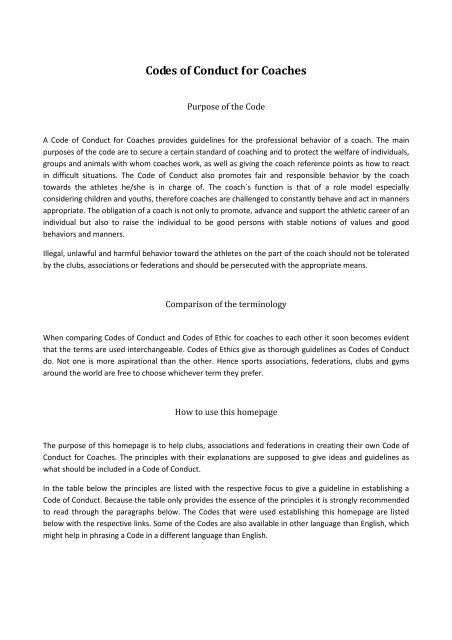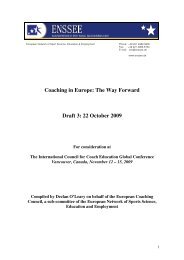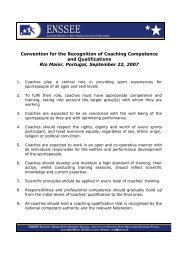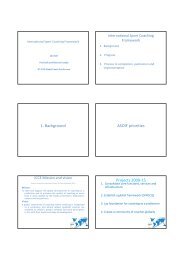Download the study (pdf) - International Council for Coach Education
Download the study (pdf) - International Council for Coach Education
Download the study (pdf) - International Council for Coach Education
Create successful ePaper yourself
Turn your PDF publications into a flip-book with our unique Google optimized e-Paper software.
Codes of Conduct <strong>for</strong> <strong>Coach</strong>es<br />
Purpose of <strong>the</strong> Code<br />
A Code of Conduct <strong>for</strong> <strong>Coach</strong>es provides guidelines <strong>for</strong> <strong>the</strong> professional behavior of a coach. The main<br />
purposes of <strong>the</strong> code are to secure a certain standard of coaching and to protect <strong>the</strong> welfare of individuals,<br />
groups and animals with whom coaches work, as well as giving <strong>the</strong> coach reference points as how to react<br />
in difficult situations. The Code of Conduct also promotes fair and responsible behavior by <strong>the</strong> coach<br />
towards <strong>the</strong> athletes he/she is in charge of. The coach´s function is that of a role model especially<br />
considering children and youths, <strong>the</strong>re<strong>for</strong>e coaches are challenged to constantly behave and act in manners<br />
appropriate. The obligation of a coach is not only to promote, advance and support <strong>the</strong> athletic career of an<br />
individual but also to raise <strong>the</strong> individual to be good persons with stable notions of values and good<br />
behaviors and manners.<br />
Illegal, unlawful and harmful behavior toward <strong>the</strong> athletes on <strong>the</strong> part of <strong>the</strong> coach should not be tolerated<br />
by <strong>the</strong> clubs, associations or federations and should be persecuted with <strong>the</strong> appropriate means.<br />
Comparison of <strong>the</strong> terminology<br />
When comparing Codes of Conduct and Codes of Ethic <strong>for</strong> coaches to each o<strong>the</strong>r it soon becomes evident<br />
that <strong>the</strong> terms are used interchangeable. Codes of Ethics give as thorough guidelines as Codes of Conduct<br />
do. Not one is more aspirational than <strong>the</strong> o<strong>the</strong>r. Hence sports associations, federations, clubs and gyms<br />
around <strong>the</strong> world are free to choose whichever term <strong>the</strong>y prefer.<br />
How to use this homepage<br />
The purpose of this homepage is to help clubs, associations and federations in creating <strong>the</strong>ir own Code of<br />
Conduct <strong>for</strong> <strong>Coach</strong>es. The principles with <strong>the</strong>ir explanations are supposed to give ideas and guidelines as<br />
what should be included in a Code of Conduct.<br />
In <strong>the</strong> table below <strong>the</strong> principles are listed with <strong>the</strong> respective focus to give a guideline in establishing a<br />
Code of Conduct. Because <strong>the</strong> table only provides <strong>the</strong> essence of <strong>the</strong> principles it is strongly recommended<br />
to read through <strong>the</strong> paragraphs below. The Codes that were used establishing this homepage are listed<br />
below with <strong>the</strong> respective links. Some of <strong>the</strong> Codes are also available in o<strong>the</strong>r language than English, which<br />
might help in phrasing a Code in a different language than English.
Main Principles and Focus of <strong>the</strong> Codes<br />
The main principles that are covered in <strong>the</strong> codes are: Competence, Trustworthiness, Respect, Fairness,<br />
Caring, Integrity, and Responsibility.<br />
Table 1. The Principles of a Code of Conduct and <strong>the</strong> main focus of <strong>the</strong> principles are presented.<br />
Principles/ Values<br />
Competence<br />
Trustworthiness<br />
Respect<br />
Fairness<br />
Focus<br />
<strong>Coach</strong> education<br />
Keep rules of confidentiality;<br />
Inspire trust in own athletes<br />
Athletes, decisions, rules, promises,<br />
commitments, privacy<br />
Fair-play; same opportunities <strong>for</strong> each athlete;<br />
no use of illegal substances and methods<br />
Caring<br />
Integrity<br />
Responsibility<br />
<strong>for</strong> athletes and animals; well-being of physical<br />
and emotional state of athletes<br />
stay true to own values and actions; act as a role<br />
model<br />
<strong>for</strong> development of <strong>the</strong> athlete; <strong>for</strong> own<br />
development as a coach;<br />
Principles of <strong>the</strong> Code<br />
The main principles that are covered in <strong>the</strong> codes are: Competence, Trustworthiness, Respect, Fairness,<br />
Caring, Integrity, and Responsibility.<br />
Competence: <strong>Coach</strong>es only use methods and techniques that <strong>the</strong>y are confident in teaching, where <strong>the</strong>y<br />
possess <strong>the</strong> qualifications <strong>for</strong>. The coach avoids using methods that are a risk to health and safety of <strong>the</strong><br />
athletes. A coach seeks continuous personal improvement. The coach keeps up with <strong>the</strong> latest<br />
developments in coaching and teaching. The coach only uses training methods that will benefit <strong>the</strong><br />
athletes.<br />
Trustworthiness: The coach has to inspire trustworthiness in athletes. The coach keeps to <strong>the</strong> rules of<br />
confidentiality and discusses with o<strong>the</strong>rs matters concerning <strong>the</strong> athlete only if he/she has discussed with<br />
<strong>the</strong> athlete be<strong>for</strong>ehand which in<strong>for</strong>mation he/she is allowed to share with a third party. The coach involves<br />
athletes in decisions that concern <strong>the</strong>m and <strong>the</strong>ir future.
Respect: A coach shows respect towards o<strong>the</strong>rs, one self, <strong>the</strong> sport, <strong>the</strong> organization and property. Respect<br />
towards o<strong>the</strong>rs means to show tolerance and to treat everyone equally regardless of <strong>the</strong>ir sex, age, race,<br />
language, socioeconomic status, ethnic origin, disability, or religion and to respect <strong>the</strong>ir rights and dignity. A<br />
coach respects <strong>the</strong> decisions made by o<strong>the</strong>rs (officials and opponents). The coach treats each athlete as an<br />
individual with own rights and needs. The coach respects promises and commitments and keeps to <strong>the</strong>m,<br />
both written and verbal. The coach respects <strong>the</strong> fact that <strong>the</strong> athlete is entitled to seek opinions and help<br />
from a third party. The coach respects <strong>the</strong> privacy of <strong>the</strong> athlete. The coach avoids any <strong>for</strong>m of harassment<br />
(sex, gender, disability) towards <strong>the</strong> athlete.<br />
Fairness: The coach is fair to <strong>the</strong> athletes. The coach provides each athlete with <strong>the</strong> same opportunities and<br />
training times. A coach shows no favoritism to one athlete over <strong>the</strong> o<strong>the</strong>r. A coach teaches athletes to be<br />
fair (fair-play) to <strong>the</strong>ir team-mates and opponents. The coach has to refrain from using any unfair and<br />
illegal training methods (including per<strong>for</strong>mance enhancing drugs). The coach has to <strong>for</strong>bear from allowing<br />
any bribery to his person or his athletes.<br />
Caring: A coach provides feedback to <strong>the</strong> athletes, and avoids too much negative feedback. A coach cares<br />
<strong>for</strong> <strong>the</strong> well-being of <strong>the</strong> athletes but avoids any kind of intimate contact with <strong>the</strong> athletes. The coach<br />
ensures that <strong>the</strong> training and competition requirements meet <strong>the</strong> abilities of <strong>the</strong> individual athlete in<br />
fitness and age. The coach instructs <strong>the</strong> athlete to a healthy life style and explains <strong>the</strong> lifelong benefits of<br />
sport. The coach leads <strong>the</strong> athlete towards becoming a mature individual who is able to take care of him-<br />
/herself, make decisions, and show responsibilities <strong>for</strong> <strong>the</strong>ir own behavior and per<strong>for</strong>mance in all life<br />
situations. The coach has to consider <strong>the</strong> wishes and opinions of <strong>the</strong> athletes. The coach has to carefully<br />
consider how to deal with <strong>the</strong> media and always keep in mind what is best <strong>for</strong> <strong>the</strong> athlete. The coach cares<br />
<strong>for</strong> <strong>the</strong> well-being of <strong>the</strong> athletes and animals he/she is in charge of.<br />
Integrity: A coach should be a person of integrity, keeping to <strong>the</strong>ir personal values in word and action at all<br />
times. A coach does not take any bribes and discourages any notion of <strong>the</strong> athlete towards taking bribes or<br />
displaying non-sportsmanship like behavior. A coach has to keep a high moral standard and has to follow it<br />
at all times. The coach acts as a role-model.<br />
Responsibility: The coach has to give <strong>the</strong> athletes <strong>the</strong> opportunities to develop <strong>the</strong>ir skills, confidence and<br />
self-esteem. The coach ensures that <strong>the</strong> training-program is adjusted to <strong>the</strong> needs and capabilities of each<br />
athlete. The coach promotes <strong>the</strong> values of team spirit and fair-play and that winning is only one part of<br />
athleticism but that fun and enjoyment are more important. The coach has <strong>the</strong> responsibility to keep up<br />
with <strong>the</strong> latest developments in training and coaching techniques and makes sure that <strong>the</strong> training facilities<br />
are in good and appropriate conditions. The coach also has <strong>the</strong> responsibility to act as a role model and to<br />
promote a healthy life style <strong>for</strong> <strong>the</strong> athletes to follow. The coach acts as an example that <strong>the</strong> athletes can<br />
copy and follow. The coach also has to keep in regular contact with <strong>the</strong> parents or legal guardians about<br />
training schedules, possible trips, rules and regulations, as well as with doctors, physio<strong>the</strong>rapists and o<strong>the</strong>r<br />
people involved in <strong>the</strong> athletic development of <strong>the</strong> athlete. <strong>Coach</strong>es should not over train <strong>the</strong> athlete, but<br />
have <strong>the</strong> athletes well-being at all times as a priority, as well as keeping <strong>the</strong>m interested in <strong>the</strong> sport. Each<br />
individual athlete should be trained in a way that <strong>the</strong>y reach <strong>the</strong>ir full potential. <strong>Coach</strong>es promote<br />
sportsmanship on and off <strong>the</strong> field. The coach also has <strong>the</strong> responsibility to care <strong>for</strong> <strong>the</strong> well-being and<br />
appropriate treatment of animals involved in <strong>the</strong> sport. The coach should also show responsible behavior<br />
towards natural resources and <strong>the</strong> environment and should motivate <strong>the</strong> athletes to take <strong>the</strong> same care.<br />
<strong>Coach</strong>es refrain from <strong>the</strong> use of per<strong>for</strong>mance enhancing drugs, smoking and alcohol. <strong>Coach</strong>es do not start
sexual relationships with <strong>the</strong>ir athletes and also discourage attempts from <strong>the</strong> athletes to initiate sexual<br />
relationships with <strong>the</strong>m.<br />
Additional in<strong>for</strong>mation<br />
Some codes require that <strong>the</strong> coach signs <strong>the</strong>m and so <strong>the</strong> coach agrees consequently to adhere to <strong>the</strong> rules<br />
stated in <strong>the</strong> code.<br />
Codes also exist <strong>for</strong> parents, athletes, officials, referees and o<strong>the</strong>r people who are in some way connected<br />
to sports. But <strong>for</strong> now this summary is concentrating on <strong>the</strong> Codes that have been established <strong>for</strong> coaches.<br />
Fur<strong>the</strong>r Reading<br />
The principles stated above were ga<strong>the</strong>red toge<strong>the</strong>r from numerous Codes of Conduct and Ethic from<br />
around <strong>the</strong> world (see list below).<br />
• American Football <strong>Coach</strong>es Association, Code of Ethics<br />
https://membership.afca.com/membership/registration/CodeofEthics.<strong>pdf</strong><br />
• Australia: <strong>Coach</strong>´s Code of Ethics by <strong>the</strong> Australian Sports Commission<br />
http://www.ausport.gov.au/supporting/ethics/strategies_and_initiatives/codes_of_behaviour<br />
• Badminton World Federation: Code of Conduct <strong>for</strong> <strong>Coach</strong>es and Technical Officials<br />
http://www.bwfbadminton.org/page.aspx?id=14923<br />
• Cali<strong>for</strong>nia Interscholastic Federation: Code of Conduct <strong>for</strong> <strong>Coach</strong>es<br />
http://www.cifccs.org/sportsmanship/<strong>Coach</strong>es%20Code%20of%20Conduct.htm<br />
• Canada: <strong>Coach</strong>es of Canada http://www.coachesofcanada.com/professionals/conduct.asp<br />
• Denmark: God opførsel <strong>for</strong> trænere (Danish Olympic Committee)<br />
http://www.dif.dk/PROJEKTER_OG_RAADGIVNING/raadgivning/etisk%20kodeks/god%20opfoersel<br />
%20<strong>for</strong>%20traenere.aspx<br />
• FA Mini Soccer: Code of Conduct<br />
http://www.<strong>the</strong>fa.com/GetIntoFootball/Players/MiniSoccer/MiniSoccerCodeOfConduct<br />
• FIFA: Code of Ethics<br />
http://www.fifa.com/aboutfifa/organisation/footballgovernance/codeethics.html<br />
• Finland: Suomen liikunta ja urheilu (Fair Play Handbook) https://slu-fibin.directo.fi/@Bin/7dc54e1d602ac2aeae00543dbc914192/1328254840/application/<strong>pdf</strong>/3639039/<br />
SLU-REPE_KIRJA_english_FINAL_low.<strong>pdf</strong><br />
• France: Association Française pour un sport sans violence et pour le Fair Play<br />
http://fairplay.franceolympique.com/accueil.php<br />
• Germany:Ehrenkodex fuer Trainerinnen und Trainer im Sport<br />
http://www.rudern.de/uploads/media/Ehrenkodex_f_r_Trainer_01.<strong>pdf</strong><br />
• Hong Kong China Rowing Association <strong>Coach</strong>ing Codes of Ethics (HKCRA CCE)<br />
http://www.rowing.org.hk/web/b5/HKCRA_<strong>Coach</strong>ing_Code_English.<strong>pdf</strong>
• Hong Kong Rugby Football Union – Youth Rugby Code of Conduct<br />
http://www.hkrugby.com/system/files/community_dept/Mini_Laws/2010-<br />
11%20HKMRFU%20Hand_Book%20-%20v3%202%20FINAL.<strong>pdf</strong><br />
• Hong Kong Wushu <strong>Coach</strong> Association <strong>Coach</strong>es´ Code of Conduct<br />
http://www.hkcoaching.org/eng.htm<br />
• Hong Kong: <strong>Coach</strong>´s Code of Conduct Hong Kong <strong>Coach</strong>ing Committee<br />
http://www.hkcoaching.com/hk/coc.asp<br />
• Hong Kong: Junior Football League Codes of Conduct http://hkjfl.com/codes-of-conduct<br />
• <strong>International</strong> Committee <strong>for</strong> Fair Play – Manifesto (CIFP)<br />
http://www.fairplayinternational.org/cifp/fair-play-charter<br />
http://www.panathlon.net/public/attivita/PI%20and%20<strong>the</strong>%20promotion%20of%20fp2.<strong>pdf</strong><br />
• <strong>International</strong> Tennis Federation Code of Ethics <strong>for</strong> <strong>Coach</strong>es<br />
http://www.itftennis.com/coaching/practicalinfo/codeofethics.asp<br />
• IPC (<strong>International</strong> Paralympic Committee) Code of Conduct <strong>for</strong> <strong>Coach</strong>es<br />
http://www.paralympic.org/export/sites/default/IPC/Reference_Documents/2008_2_Classification<br />
_Code6.<strong>pdf</strong><br />
• NASPE (National Association <strong>for</strong> Sport and Physical <strong>Education</strong>; USA): A <strong>Coach</strong>´s Code of Conduct<br />
http://www.aahperd.org/naspe/standards/upload/A-<strong>Coach</strong>-s-Code-of-Conduct-2009.<strong>pdf</strong><br />
• Ne<strong>the</strong>rlands: Seksuele intimidatie NOC*NSF http://nocnsf.nl/nocnsf.nl/olympische-droom/sporten-maatschappij/seksuele-intimidatie/seksuele-intimidatie<br />
• New Zealand SPRC: <strong>Coach</strong>es´ Code of Ethics http://www.sportnz.org.nz/en-nz/communities-andclubs/<strong>Coach</strong>ing/Becoming-a-<strong>Coach</strong>/<strong>Coach</strong>es-Code-of-Ethics/<br />
• Slovenia: Football Association <strong>Coach</strong>´s Code of Conduct<br />
http://www2.nzs.si/2000/nzs/Kodeks%20obvez%20in%20vedenja%20nogometnih.<strong>pdf</strong><br />
• Slovenia: Tennis Federation <strong>Coach</strong>´s Code of Conduct<br />
http://www.trenerska.org/TOTZS,,delovanje,trenerski_kodeks.htm<br />
• Switzerland: Ethik Charta http://www.swissolympic.ch/desktopdefault.aspx/tabid-<br />
4245//4333_read-25145/<br />
• UEFA: Fair Play, Code of Conduct <strong>for</strong> Officials<br />
http://www.uefa.com/MultimediaFiles/<strong>Download</strong>/competitions/WorldCup/67/17/65/671765_DO<br />
WNLOAD.<strong>pdf</strong><br />
• UK – Code of Practice <strong>for</strong> Sports <strong>Coach</strong>es Rights/ Relationships/ Responsibilities<br />
http://www.cambridge.gov.uk/public/docs/code-of-practice-<strong>for</strong>-sports-coaches.<strong>pdf</strong><br />
• United States Olympic Committee: <strong>Coach</strong>ing Ethics Code<br />
http://usaluge.org/tryluge/coaching_ethics.<strong>pdf</strong>







